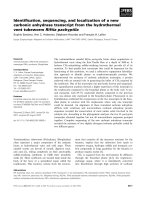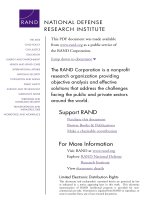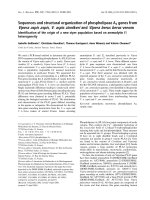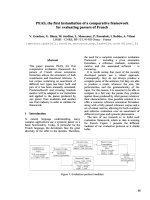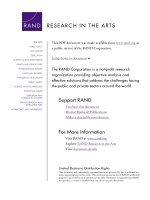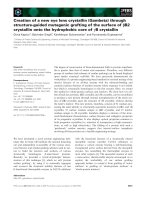First record of the genus Sulorgilus van Achterberg (Hymenoptera: Braconidae: Orgilinae) from Vietnam and China, with description of a new species
Bạn đang xem bản rút gọn của tài liệu. Xem và tải ngay bản đầy đủ của tài liệu tại đây (6.96 MB, 6 trang )
TAP CHIFirst
SINH
HOC
38(3):
310-315
record
of2016,
the genus
Sulorgilus
DOI:
10.15625/0866-7160/v38n3.8723
FIRST RECORD OF THE GENUS Sulorgilus van Achterberg
(Hymenoptera: Braconidae: Orgilinae) FROM VIETNAM AND CHINA,
WITH DESCRIPTION OF A NEW SPECIES
Khuat Dang Long1*, Cornelis van Achterberg2
1
Institute of Ecology & Biological Resources, VAST, Vietnam, *
2
Department of Terrestrial Zoology, NCB Naturalis, Postbus 9517, 2300 RA Leiden,
The Netherlands
ABSTRACT: Sulorgilus van Achterberg, 1994, is recorded for the first time from Vietnam and
China. It is a monotypic genus of the subfamily Orgilinae (Hymenoptera: Braconidae) with one
species described from Sulawesi (Indonesia). A new species, Sulorgilus devriesi Long & van
Achterberg, sp. n., is described and illustrated. A key to the species of the genus Sulorgilus is
added.
Keywords: Hymenoptera, Braconidae, Orgilinae, Sulorgilus, new record, new species, Oriental,
Vietnam, China, Indonesia.
Citation: Khuat Dang Long, Achterberg C. van, 2016. First record of the genus Sulorgilus van Achterberg
(Hymenoptera: Braconidae: Orgilinae) from Vietnam and China, with description of a new species. Tap chi
Sinh hoc, 38(3): 310-315. DOI: 10.15625/0866-7160/v38n3.872.
*Corresponding author:
INTRODUCTION
Vietnam and China.
The subfamily Orgilinae Ashmead, 1900
(Hymenoptera: Braconidae) is a rather small
and rarely collected subfamily with 356 species
in 13 genera [13]. The few data known on the
biology of Orgilinae indicate that Orgilinae are
solitary
koinobiont
endoparasitoids
of
concealed
lepidopterous
larvae.
Morphologically, the relationship of the
Orgilinae with the Microtypinae is analyzed by
van Achterberg (1992b) [4].
MATERIALS AND METHODS
Up to now, two genera of the subfamily
Orgilinae occur in Vietnam: Orgilonia van
Achterberg, 1987, and Stantonia Ashmead,
1904, with eight recorded species [11, 12], of
those only one species, Orgilonia ashmeadi
(Viereck, 1911) was recorded with host
information. It is reported as a parasitoid of the
rice leaf folder, Cnaphalocrocis medinalis
Guénee (Pyralidae), which is a serious pest of
paddy rice in Vietnam [12] and China. The
newly recorded third genus, Sulorgilus van
Achterberg, was established in 1994 for
Sulorgilus reclinervis van Achterberg, 1994,
from Indonesia (Sulawesi) [5]. The genus is
recorded for the first time for the fauna of
310
The Orgilinae specimens from Vietnam are
in the collections of the Institute of Ecology &
Biological Resources (IEBR) at Ha Noi, the
Vietnam National Museum of Nature (VNMN)
at Ha Noi and the Naturalis Biodiversity Center
(RMNH) at Leiden. They were assembled by
the authors during numerous expeditions in
Vietnam. The specimen from China is deposited
in the Institute of Zoology, Chinese Academy of
Sciences (IZAS) at Beijing.
Terminology used in this paper follows van
Achterberg (1993) [4], and sculpture terms are
based on Harris (1979)[10]. For the
identification of the genera of Orgilinae see van
Achterberg (1994) [5]; for additional references
and data, see Yu et al. (2016)[13]. The
photographs were made with a Canon G15
camera attached to a Olympus®SZ61 binocular
microscope at IEBR and processed with Adobe
Photoshop CS5 to adjust the size and
background. The following abbreviations are
used: OD=diameter of posterior ocellus,
OOL=ocular-ocellar line, POL=postocellar line,
Khuat Dang Long, Cornelis van Achterberg
‘Orgi.+number’=code number indexing for
specimens of the Orgilinae in the collection,
MT=Malaise trap, NE=northeast, VAST stands
for Vietnam Academy of Science and
Technology. The scale-lines of the plates
indicate mm.
Sulorgilus van Achterberg, 1994
Sulorgilus van Achterberg, 1994: 175.
Type-species Sulorgilus reclinervis van
Achterberg, 1994.
Diagnosis: Head comparatively small
(compared to mesosoma) (fig. 1, and see fig. 17
in van Achterberg, 1994); clypeus normal,
truncate ventrally (figs 3, 7); occipital carina
strong laterally, up to upper level of eye (fig. 3);
frons deeply concave and largely smooth
medially (fig. 2); malar suture absent; mandible
slender basally, strongly twisted apically and
outer tooth distinctly longer than inner tooth,
robust (fig. 7). Mesosoma robust, its length of
about 1.2 times its height (fig. 4, and see fig. 17
in van Achterberg, 1994); dorsal pronope round,
rather small and deep (see fig. 23 in van
Achterberg, 1994); prepectal carina completely
absent (fig. 4); precoxal sulcus wide and
shallow, coarsely punctate, partly reticulatepunctate (fig. 4); notauli complete, narrow,
finely crenulate or punctate, posteriorly more or
less flat (fig. 5) or narrowly depressed (see fig.
23 in van Achterberg, 1994); mesoscutum
densely setose, very densely and coarsely
punctate, punctures nearly touching each other;
scutellum strongly convex, coarsely punctate
(fig. 5); scutellar sulcus deep, without strong
carinae (fig. 5); propodeum without median
carina anteriorly, and with medium-sized
lamella posteriorly (see fig. 17 in van
Achterberg, 1994); propodeal spiracle short
elliptical (see fig 23 in van Achterberg, 1994).
Fore wing: vein 1-SR absent and first discal cell
comparatively robust (fig. 8); vein 1-M curved
basally (fig. 8) or nearly straight (see fig. 14 in
van Achterberg, 1994) ; vein r-m present; vein
cu-a oblique or vertical, interstitial (fig. 8) or
subinterstitial (see fig. 14 in van Achterberg,
1994); vein 2-M medium-sized; vein SR1
straight. Hind wing: vein M+CU longer than
vein 1-M, plical lobe narrow; vein cu-a strongly
reclivous, straight or near so (fig. 9, and see figs
14, 15 in van Achterberg, 1994). Legs: tarsal
claws bifurcate (fig. 10); outer face of hind tibia
bristly, with two pegs apically (fig. 11, and see
fig. 24 in van Achterberg, 1994); coxa rather
enlarged, outer side of hind coxa largely
coarsely punctate; length of first tergite about
1.1-1.5 times its apical width (fig. 6), its dorsal
carinae absent; second metasomal tergite largely
smooth, without depressions; third tergite
without sharp lateral crease; ovipositor with
minute notch subapically; length of ovipositor
sheath 0.7-0.9 times fore wing.
Biology. Unknown.
Distribution. Oriental.
Key to species of the genus Sulorgilus van Achterberg
1. Notauli rather long, convergent, united posteriorly near scutellar sulcus (fig. 28 in van
Achterberg, 1994); vein 1-M of fore wing more or less straight, and vein CU1a of fore wing faintly
sclerotized (fig. 14 in van Achterberg, 1994); first metasomal tergite about 1.5 times longer than
wide apically (fig. 26 in van Achterberg, 1994). Indonesia…….S. reclinervis van Achterberg, 1994
- Notauli short, parallel-sided anteriorly, united posteriorly far in front of scutellar sulcus and a flat
area (fig. 5); vein 1-M of fore wing distinctly curved basally (fig. 8), and vein CU1a of fore wing
largely sclerotized (fig. 8); first metasomal tergite about as long as wide apically (fig. 6). Vietnam,
China……………………………………………………...S. devriesi Long & van Achterberg, sp. n.
Description of species
Sulorgilus devriesi Long & van Achterberg,
sp. n. (Figs 1-11)
Material. Holotype, ♀ (VNMN), ‘Orgi.058’,
“NE. Vietnam: Thai Nguyen, Dai Tu, Phu
Xuyen, orchard, MT, 21°39’N 105°32’E, 360
m, 20-30.ix.2007, K.D. Long”. Paratypes: 1 ♀
(RMNH), “N. Vietnam: Viet Tri, n[ea]r Thanh
Son, Thuong Cuu, 20°59'E 105°8'N, 350-400
311
First record of the genus Sulorgilus
m, 11-16.x.1999, Malaise traps, R. de Vries,
RMNH’99”; 1 ♀ (IZAS), “[China:] Yunnan,
Xishuangbanna, Mengla, 22.viii.1958, 10501,080 m, Wang Shu-yong”.
Description. Holotype, female, length of
body 6.6 mm, length of fore wing 6.8 mm and
length of ovipositor sheath 0.7 times as long as
fore wing.
Head. Antenna with 45 segments, middle
segments longer than wide (5:4), third and
fourth segments 2.25 and 1.5 times as long as its
width respectively (9:4, 6:4); penultimate
antennal segment half as long as apical
segment; apical segment with distinct spine;
width of face equal to height of face and
clypeus combined (fig. 7); maxillary palp 0.8
times as long as height of head; malar space 1.2
times as long as mandible width (6:5); clypeus
nearly straight, distance between tentorial pits
twice as long as distance between pits and eye
margin (fig. 7); in anterior view eye twice as
high as wide; in dorsal view length of eye 2.2
times
as
long
as
temple
(11:5);
POL:OD:OOL=6:3:6 (fig. 2); distance between
front and hind ocelli:OOL =2:3; in lateral view
eye 1.6 times wider than temple (fig. 3); face
largely punctate and nearly rugose-punctate;
clypeus distinctly punctate; vertex and temple
mainly rugose-punctate.
Figure 1. Sulorgilus devriesi Long & van
Achterberg, sp. n., holotype, female, habitus,
lateral aspect.
Figures 2-11. Sulorgilus devriesi Long & van Achterberg, sp. n., holotype, female
2. Head, dorsal aspect; 3. Head, lateral aspect; 4. Mesopleuron; 5. Mesonotum; 6. First-third metasomal
tergites, dorsal aspect; 7. Head, anterior aspect; 8. Fore wing; 9. Base of hind wing; 10. Hind tarsal claw; 11.
Pegs on outer face of hind tibia apex.
312
Khuat Dang Long, Cornelis van Achterberg
Mesosoma. Length of mesosoma 1.1 times
as long as high (48:42); notauli short and
shallow, parallel-sided anteriorly, united
posteriorly far in front of scutellar sulcus, in
front of flat area (fig. 5); parallel-sided
anteriorly, flat posteriorly and with sparse
distinct punctures (fig. 5); middle and lateral
lobes of mesoscutum largely punctures (fig. 5);
scutellum with sparse distinct punctures;
precoxal sulcus short, wide, shallow, largely
rugose (fig. 4); area above precoxal sulcus
smooth posteriorly, largely punctate anteriorly;
area bellow precoxal sulcus distinctly densely
punctate; metapleuron largely rugose-punctate;
propodeum finely punctate.
Wings. Fore wing: pterostigma 3.7 times as
long as wide (22:6); vein r:2-SR:3SR+SR1=10:13:40; vein r arising near middle
of pterostigma; vein cu-a interstitial (fig. 8);
vein 1-M distinctly curved basally; vein CU1a
largely sclerotized (fig. 8); vein CU1b:3CU1=2:7 (fig. 8); vein M+CU:1-M:1rm=22:16:20. Hind wing: vein M+CU slightly
longer than robust vein 1-M; hind wing
membrane sparsely setose but base and around
vein cu-a glabrous (fig. 9).
Legs. Length of femur, tibia and basitarsus
of middle leg 7.0, 9.0 and 12.0 times their
width, respectively; inner and outer middle
tibial spurs 0.6 and 0.4 times as long as middle
basitarsus, respectively; length of femur, tibia
and basitarsus of hind leg 3.6, 6.3 and 7.0 times
as long as their width, respectively; hind inner
and outer tibial spurs 0.5 and 0.4 times as long
as basitarsus, respectively; inner side of hind
basitarsus with special strong setae; outer face
of hind tibial apex with two pegs (fig. 11); hind
tarsal claw bifurcate (fig. 10).
Metasoma. First tergite rather short, 1.1
times as long as its apical width (20:18), its
surface largely smooth (fig. 6); second suture
fine; second tergite 1.3 times as long as third
tergite; second-sixth tergite polished, smooth;
length of ovipositor sheath 0.7 times as long as
fore wing.
Colour. Pale yellow; basal third of antenna
yellow (but scapus dark brown dorsally) and
remainder light brown; frons medially,
stemmaticum, middle (except apex light yellow)
and lateral lobes of mesoscutum, mesosternum
black; fore legs light yellow, except telotarsus
pale brown; middle legs light yellow, except
trochanters and trochantellus ventrally, tibia and
basitarsus apically, and second-fifth tarsal
segments pale brown; hind coxa apically,
trochanters and trochantellus, hind femur
narrowly basally and apically, apical third of
hind tibia, hind basitarsus (but with yellow
basal ring) and second-fifth tarsal segments
blackish brown; veins of fore wing light brown,
sparsely pigmented basally but densely
pigmented apically (fig. 8); first and second
metasomal tergites yellow with blackish brown
stripes at apex of first tergite and at base of
second tergite; third tergite dark brown, yellow
laterally and remainder light yellow. Paratype
has frons, vertex and apex of hind coxa yellow,
but paratype from Yunnan has frons and vertex
more extensively darkened than holotype.
Male. Unknown
Distribution. NE Vietnam (Thai Nguyen);
NW Vietnam (Viet Tri); China (Yunnan,
Xishuangbanna).
Biology. Unknown
Etymology. The epithet refers to the
collector of the paratype deposited in RMNH,
The Netherlands, Mr. Robbert de Vries (Leiden)
who had an important role in the fieldwork in
Vietnam and in preparing the braconid
specimens in RMNH.
Aknowledgements: This paper has been
produced with a grant of the Vietnam National
Foundation for Science and Technology
Development (NAFOSTED). The second author
thanks the curators of the Entomological
Collection in the Institute of Zoology, Chinese
Academy of Sciences at Beijing for the loan of
specimens.
REFERENCES
1. Achterberg C. van, 1987. Revisionary notes
on the subfamily Orgilinae (Hymenoptera:
Braconidae). Zoologische Verhandelingen,
Leiden, 242: 1-111.
2. Achterberg C. van, 1992. Bentonia gen.
313
First record of the genus Sulorgilus
nov. (Hymenoptera: Braconidae: Orgilinae)
from Brazil. Zoologische Mededelingen,
Leiden, 66(22): 339-344.
3. Achterberg C. van, 1992. Revision of the
genera of the subfamily Microtypinae
(Hymenoptera: Braconidae). Zoologische
Mededelingen, Leiden, 66(26): 369-380.
4. Achterberg C. van, 1993. Illustrated key to
the subfamilies of the Braconidae
(Hymenoptera:
Ichneumonoidea).
Zoologische Verhandelingen, Leiden 283:
1-189, figs 1-66, photos 1-140, plates 1-102.
5. Achterberg C. van, 1994. Two new genera
of tribe Orgilini Ashmead (Hymenoptera:
Braconidae). Zoologische Mededelingen,
Leiden, 68(16): 173-190.
6. Braet Y., Achterberg C. van, Chen X., 2000.
Notes on the tribe Mimagathidini Enderlein,
with the description of a new genus
(Hymenoptera: Braconidae: Orgilinae).
Zoologische Mededelingen, Leiden, 73 (31):
465-486.
7. Braet Y., Achterberg C. van, 2003.
Doryctorgilus gen. nov. and other new taxa,
with a study of the internal microsculpture
of the ovipositor in the subfamily Orgilinae
Ashmead (Hymenoptera: Braconidae).
Zoologische Mededelingen, Leiden, 77(6):
127-152.
8. Braet Y., Quicke D. L. J., 2004. A
phylogenetic analysis of the Mimagathidini
314
with revisionary notes on the genus
Stantonia Ashmead, 1904 (Hymenoptera:
Braconidae: Orgilinae). Journal of Natural
History, 38(12): 1489-1589.
9. Chen Xuexin, He Junhua, Ma Yun, 2004.
Fauna
Sinica,
Insecta
Vol.
37,
Hymenoptera: Braconidae, (II): 351-533.
10. Harris R.A., 1979. A glossary of surface
sculpturing.
Occasional
Papers
in
Entomology, California Department of Food
and Agriculture, 28: 1-33.
11. Khuat Dang Long, Achterberg C. van, 2014.
An additional list with new records of
braconid wasps of the family braconidae
(Hymenoptera) from Vietnam. Tap chi Sinh
hoc 36(4): 397-415. DOI: 10.15625/08667160/v36n4.5979.
12. Khuat Dang Long, Belokobyskij S. A.,
2003. A preliminary list of the Braconidae
(Hymenoptera) of Vietnam. Russian
Entomological Journal, 12(4): 385-398.
13. Yu D. S. K., Achterberg C. van, Horstmann
K., 2016. Taxapad 2016, Ichneumonoidea
2015.
Database
on
flash-drive.
www.taxapad.com,
Nepean,
Ontario,
Canada.
14. Wu Z., Chen J., Huang J., 1999. A new
species of the subfamily Microtypinae
(Hymenoptera: Braconidae) from China.
Journal of Fujian Agricultural University,
28(2): 171-174.
Khuat Dang Long, Cornelis van Achterberg
GHI NHẬN MỚI GIỐNG Sulorgilus van Achterberg
(Hymenoptera: Braconidae: Orgilinae) TỪ VIỆT NAM VÀ TRUNG QUỐC
VỚI MÔ TẢ MỘT LOÀI MỚI CHO KHOA HỌC
Khuất Đăng Long1, Cornelis van Achterberg2
1
Viện Sinh thái và Tài nguyên Sinh vật, Viện Hàn lâm KH & CN Việt Nam
Department of Terrestrial Zoology, NCB Naturalis, Postbus 9517, 2300 RA Leiden,
The Netherlands
2
TÓM TẮT
Sulorgilus van Achterberg, 1994 là một giống hiếm gặp, thuộc họ ong ký sinh Braconidae, phân họ
Orgilinae. Giống này được chỉ định trên mẫu chuẩn loài (type-species) Sulorgilus reclinervis van Achterberg,
1994 từ Indonesia (Sulawesi). Trong bài này, lần đầu tiên ghi nhận giống Sulorgilus từ khu hệ ong ký sinh ở
Việt Nam và Trung Quốc với mô tả 1 loài mới cho khoa học, đó là Sulorgilus devriesi Long & van
Achterberg, sp. n. Ngoài những đặc điểm mô tả và ảnh minh họa loài mới này, bài báo còn đưa ra khóa định
loại và những đặc điểm hình thái để so sánh sự khác biệt của loài này với một loài duy nhất đã biết trước đây
từ khu hệ của Indonesia, Sulorgilus reclinervis van Achterberg.
Từ khóa: Ghi nhận mới, loài mới, ong ký sinh, Đông Phương, Việt Nam, Indonesia, Trung Quốc.
Received 25 August 2016, accepted 20 September 2016
315
